The Rosetta Stone, discovered in 1799 during Napoleon’s campaign in Egypt, is one of the most significant archaeological finds in history. Inscribed in hieroglyphic, demotic, and Greek, it provided the key to deciphering ancient Egyptian hieroglyphs. Jean-François Champollion’s work on the stone in 1822 launched the field of Egyptology. The stone, which records a decree honoring King Ptolemy V, served different audiences through its trilingual inscription. Now displayed in the British Museum, it remains a powerful symbol of linguistic discovery and cultural connection.
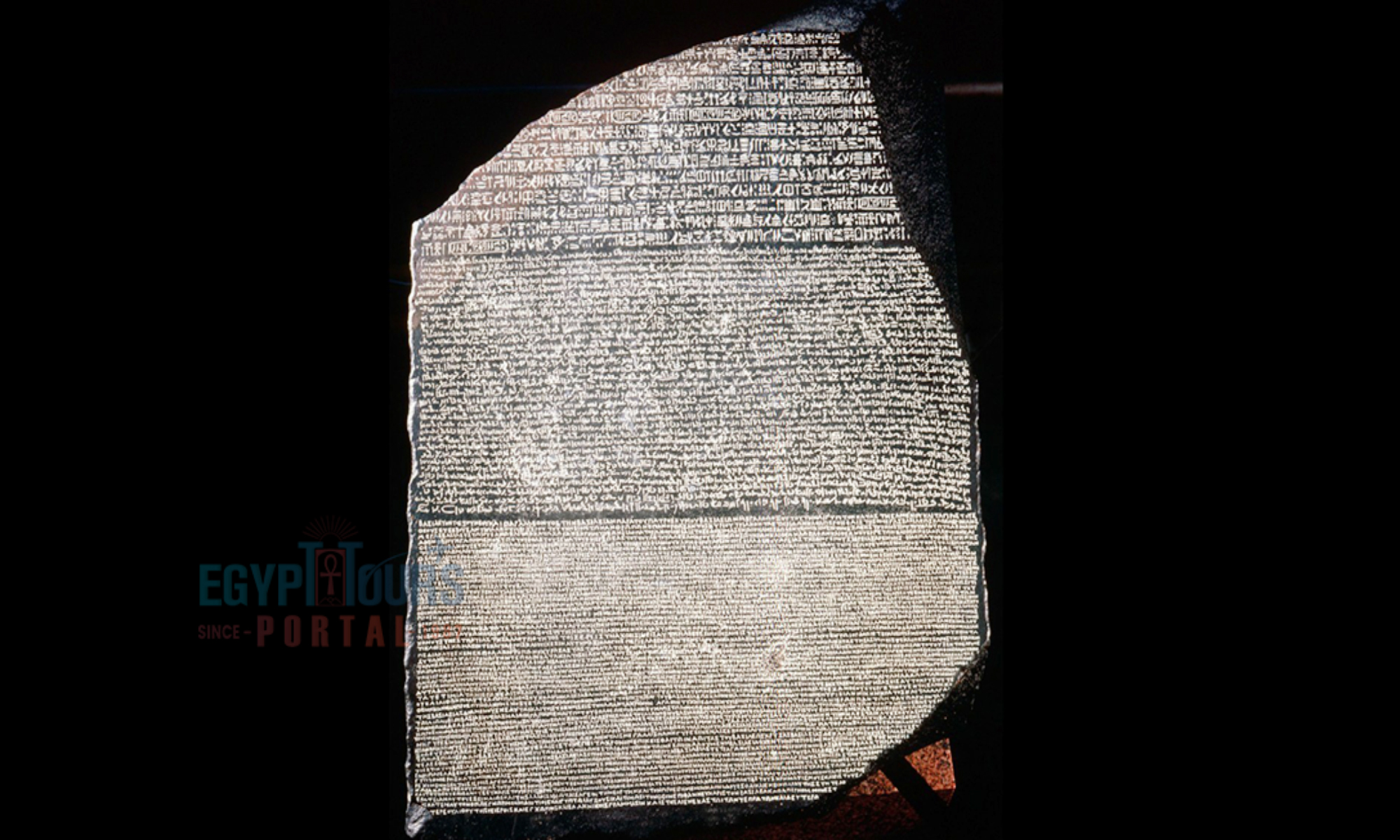
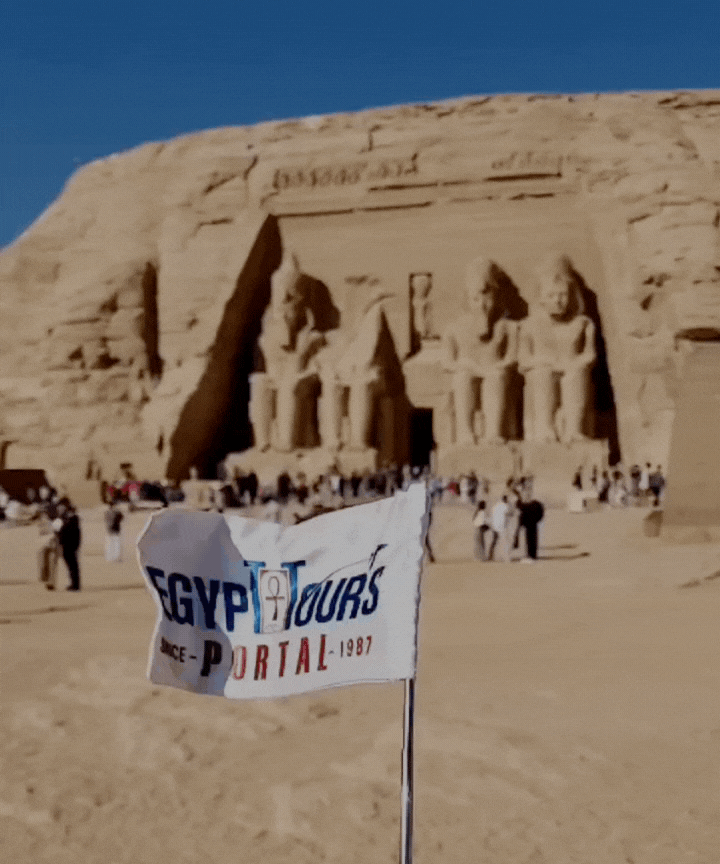
The Rosetts stone is a true solidification of the saying: Behind every stone in Egypt, there is a story that goes back thousands of years. It is hard to imagine how a simple rock can change the course of history, often recognized as the most important archeological artifact in modern history. "The Rosetta Stone" was the key to deciphering the ancient Egyptian hieroglyphics and shed light on the hidden, mysterious secrets of the ancient Egyptian civilization.
The ancient Egyptian writing system of hieroglyphics was the subject of great debate since its death in the 2nd century BC, but in the early 19th century AD, it was raised from the dead with wonders and miracles in hand. Ancient Egyptian literature came to light once again after the decipherment of this enigmatic stone that changed the face of the entire world.
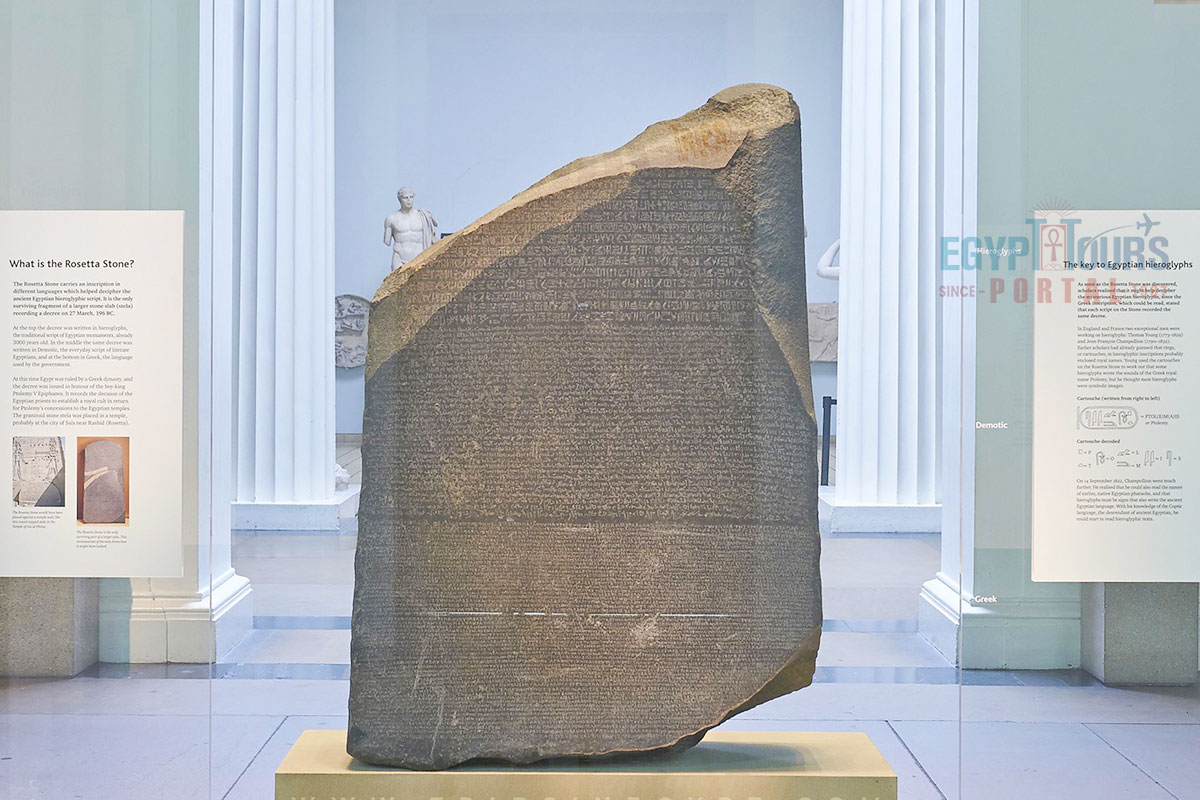
The Rosetta Stone was discovered by a French soldier named Pierre-François Bouchard, who was part of Napoleon Bonaparte’s military campaign in Egypt. The discovery occurred during Napoleon's Egyptian expedition (1798–1801), which included both military efforts and a scholarly mission. Alongside Bouchard were teams of 150 scholars in different fields known as "savants," who were tasked with documenting the history, geography, and culture of Egypt.
The Rosetta Stone was found in the town of Rosetta at Port Saint Julien, now known as Rashid, located in the Nile river Delta region of northern Egypt. It was stuck in an old wall during the rebuilding of a fort named Fort Julien. This location, near the Mediterranean sea coast, had historically been an important center for trade and military fortifications.
The Rosetta Stone was discovered on July 15, 1799, during the French occupation of Egypt under Napoleon Bonaparte. At the time, the French forces were in the process of constructing military defenses in Rosetta as part of their broader campaign to control Egypt. The stone was subsequently handed over to scholars and became a key object of study.
The stone was uncovered by accident during construction. Bouchard and his team were working on the foundation of Fort Julien, where they stumbled upon a large black slab made of granodiorite. Recognizing that it contained inscriptions in multiple languages, Bouchard and other French scholars quickly realized its potential significance. Although they did not fully comprehend its historical importance at the time, they understood that the inscriptions could be vital for deciphering Egypt’s ancient language.
After the French were defeated by British forces in 1801, the Rosetta Stone was seized by the British as part of the Treaty of Alexandria. The British transported the artifact to England, where it became the property of the British Museum in London, where it has been on display since 1802.
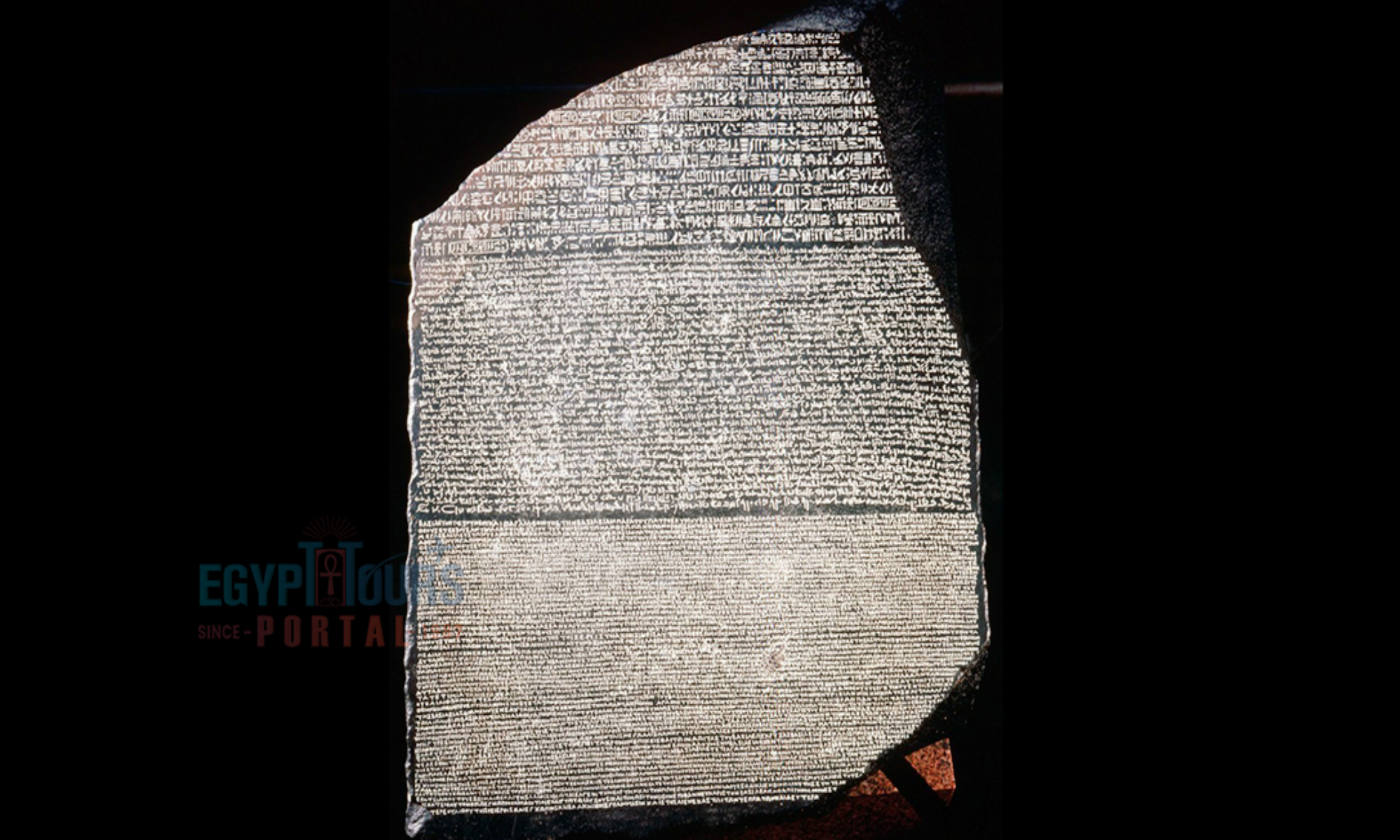
The Rosetta Stone contains an inscription written in three distinct scripts hieroglyphic script of 14 lines, a demotic text of 32 lines and a Greek text of 54 lines, narrating the same affair which is a decree issued by a council of priests asserting the divine status of King Ptolemy V (205-180 BCE). The languages on the stone formed a unique connection, and each had a role to play, which included:
Egyptian Hieroglyphs were the formal writing system used in ancient Egypt, primarily for religious texts, inscriptions on monuments, and royal decrees. Hieroglyphs consisted of a combination of logographic and alphabetic symbols. At the time the Rosetta Stone was created, hieroglyphs were used mostly for religious and ceremonial purposes, especially in temple and tomb inscriptions. The hieroglyphic text was meant for the Egyptian priesthood, who would have been the primary users and interpreters of this sacred script.
Demotic was a simplified and more cursive form of Egyptian writing, used in the daily administrative, legal, and business documents of the Ptolemaic and late pharaonic periods. It developed from earlier scripts like hieratic and was more accessible to the common people of Egypt. The Demotic script on the Rosetta Stone was the version of the text intended for the general Egyptian populace and for use in governmental affairs.
Ancient Greek was the official language of the Ptolemaic rulers of Egypt, who were descendants of Alexander the Great’s general, Ptolemy I. After Alexander’s conquest in 332 BCE, the Greek language became the administrative and ruling language of Egypt under the Hellenistic Ptolemaic dynasty. The Greek text was intended for the Greek-speaking elites and government officials who governed Egypt then. The inclusion of Greek reflects the hybrid Greco-Egyptian nature of the Ptolemaic state.
The presence of the same decree in three scripts on the Rosetta Stone enabled Jean-François Champollion, using the Greek section, which could still be read and understood by contemporary linguists, as a basis for deciphering the Egyptian hieroglyphs and Demotic script. This breakthrough in 1822 opened the door to understanding thousands of years of previously undecipherable Egyptian inscriptions and texts, making the Rosetta Stone the key to the establishment and study of Egyptology.
Discover the astonishing language of the ancient Egyptian civilization
Read More
The rosetta stone is an uncompleted grey and pink granodiorite stela dating to 196 BC which holds a decree of king Ptolemy V of Egypt in three languages: Hieroglyphics, Domatic, and Greek, all containing the same texts and meaning which was the key to decipher and fully understand the language and writing system of hieroglyphics.
The hieroglyphs were known to be the language of the priests, demotic texts were the common language of that time, and Greek was used for administrative purposes. The Rosetta stone measures 112.3 by 75.7 cm tall and 28.4 cm thick. It contains 14 lines of hieroglyphic, 32 lines of demotic texts, and 54 lines of Greek texts. The two top corners and the bottom right corner of the stela are missing. The back of the stone is rough, while the front is smooth and filled with different scripts.
It was created in the Hellenistic period during the Ptolemaic dynasty on behalf of King Ptolemy V in 196 BC by a priestly council of memphis that affirms the royal cult of King Ptolemy, one year directly after his coronation.
It was displayed in a temple during ancient Egypt near the city of Sais and was then moved in the medieval period, then to the town of Rosetta in the Nile delta, where it was lost forever, or that's what we sought. The stone was miraculously discovered at Port Saint Julien in the city of Rosetta (El-Rashid) in 1799 AD by an officer engineer, Bouchard of Napoleon's army.
The stone was extracted from an old wall that was under renovation. The stone was later seized by a British general turner, after the defeat of Napoleon in 1801. Then, in 1802, the stone was moved to the British Museum in London, where it still resides and is considered one of the most-visited objects in the museum till today.
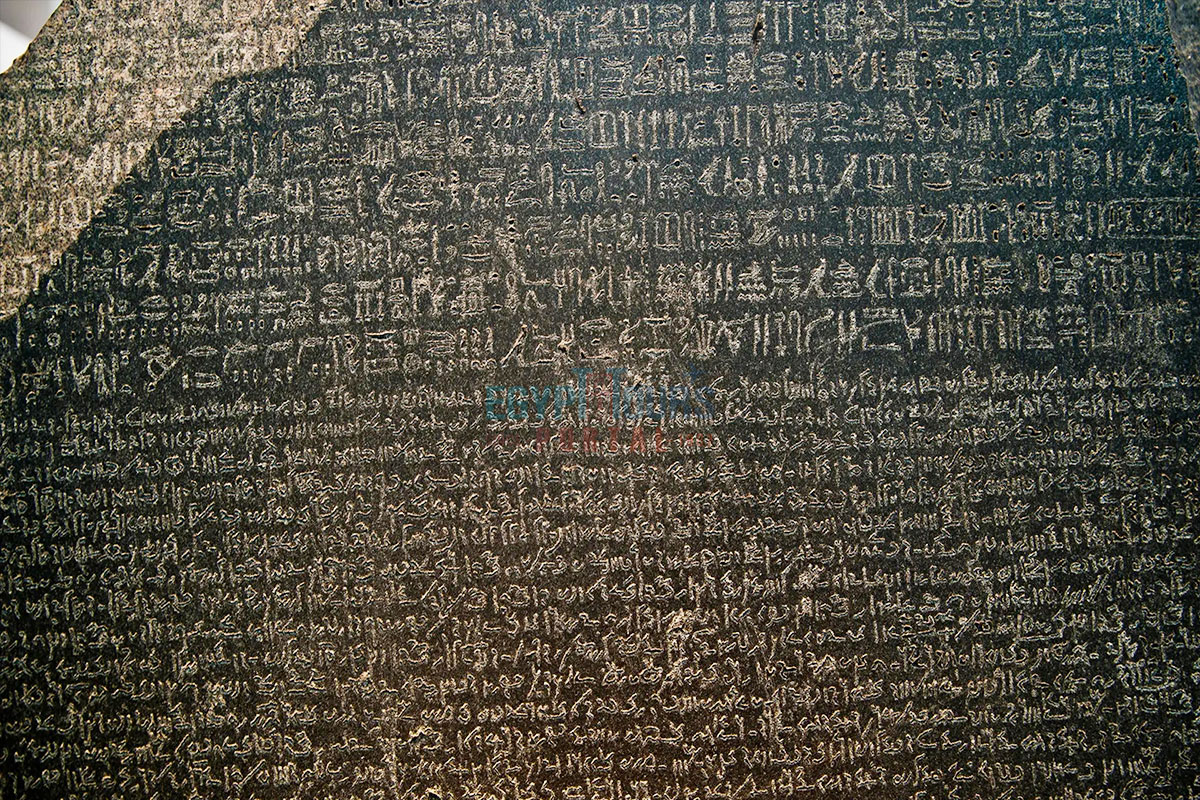
The texts on the rosetta stone talks about the achievements and the justice & productive rule of Ptolemy V. The texts talk about the prosperity brought to Egypt, the construction of temples and water canals and the restoration of old ones, the reduction and elimination of taxes, the release of many prisons who were considered enemies of the state and the expansion of the Egyptian empire.
The texts also showcase Ptolemy as the god Ptolemy, beloved of Ptah. The Rosetta Stone details that the king's birthday and coronation on the last day of the 17th of each month were celebrated as festivals. These decrees were written in three writing systems, and then the stones were set up in all the temples next to the statue of this great king.
Explore the remarkable texts of the ancient Egyptian civilization
Read More
The deciphering process of the rosette stone was largely accomplished by Thomas Young, an English physicist, and Jean-François Champollion of France. The Rosetta Stone held six identical cartouches (oval figures enclosing hieroglyphs). Young was the first person to show that some of the hieroglyphs on the stone wrote the sound of the royal name of Ptolemy.
He deciphered the cartouche and proved that the cartouches found in other inscriptions were the names of royalty. He also discovered how hieroglyphic signs were to be read. Then came Champollion, who cracked the hieroglyphs code by realizing that some of the signs were alphabetic, syllabic, and determinative in 1822.
He was able to use his talent and knowledge of ancient languages to show the link between hieroglyphs and their Greek equivalents. He showcased that the hieroglyphics were a combination of phonetic and ideographic signs that represented the sound of the early ancient Egyptian language. Champollion became the founding father of Egyptology.
The history of Egypt is filled with wonder and magic, so don't miss the chance to explore the incredible beauty of the land of pharaohs in the majestic cities of cairo, alexandria, luxor and aswan through our nile cruises and Egypt tours, where you will hear the true calling of ancient history among some of the most enchanting monuments in the world.
Private 4 Days Cairo Tour Packages for South African Travelers 4 days Cairo Egypt To...
Tour Location: Cairo – Giza...
5 Days Cairo and Alexandria Tour Package For South African Travelers 5 days Cairo an...
Tour Location: Cairo/Giza/Alexandria...
6 Days Cairo, Luxor & Aswan Tour Package For South African Travelers 6 days Cair...
Tour Location: Cairo/Giza/Aswan/Luxor...
Amazing 7 Days Cairo and Hurghada Holiday for South African Travelers 7 Days Cairo &...
Tour Location: Cairo – Giza – Hurgh...
The Rosetta stone acted as the key for deciphering the meaning of the Egyptian hieroglyphs, the writing system that had been a mystery for thousands of years. On the stone, which was discovered in 1799 are the same text in three scripts: Greek, Demotic, and Egyptian hieroglyphs, which allowed Jean-François Champollion, to compare the Greek text, which was known, to the other two thus enabling us to understand the structure and the meaning of the the hieroglyphic script. This breakthrough opened up a wealth of information about Ancient Egyptian history, culture, and religion.
The Rosetta Stone is a vital element and property of the Egyptian historical and cultural heritage. It was made in Egypt from Egyptian materials and by Egyptian hands, and then stolen during a period of foreign occupation by Napoleon’s French forces then once again stolen by the British.
Returning the stone to its country of origin would be a symbolic act of respect and recognition of Egypt's historical importance and would rectify a legacy of colonial exploitation. Also, having the chance for travelers from all over the world to explore the stone in its authentic cultural and geographic context.
Napoleon Bonaparte led a military expedition to Egypt in 1798 to control the Mediterranean region, establishing French dominance and disrupting British trade routes. Napoleon brought along a team of over 150 scientists, scholars, and engineers, collectively known as the “savants,” who were tasked with studying and documenting Egypt’s history, culture, and geography.
The Rosetta Stone was discovered by accident in 1799 by French soldiers during the construction of a fort near the town of Rosetta (modern-day Rashid) in the Nile Delta. This scientific expedition contributed greatly to the cultivation of the field of Egyptology.
The Rosetta Stone was created in 196 BCE during the Ptolemaic Period, a time when Egypt was ruled by a dynasty of Greek-speaking rulers following the conquests of Alexander the Great. The stone was carved under the reign of Ptolemy V, and it commemorates a decree issued by a council of priests affirming the divine status of the young king.
The period was one of both continuity and change for Egypt. While the Ptolemies embraced certain Egyptian traditions, they also introduced Hellenistic influences. Egypt was facing internal strife and revolts, as local populations resisted foreign rule and high taxation. The Ptolemies maintained a hybrid Greco-Egyptian culture, which is reflected in the trilingual inscription on the Rosetta Stone.
When the Rosetta Stone was found in 1799, Egypt was under Ottoman rule, and the primary spoken language was Arabic. While the ancient Egyptian language had ceased to be spoken by this time, Coptic, the latest stage of the Egyptian language written in the Greek alphabet, survived as a liturgical language in the Coptic Christian Church. Arabic had become the dominant language of Egypt after the Islamic conquest in the 7th century.
The Rosetta Stone contains the same decree written in three scripts:
Egyptian Hieroglyphs, which were used for religious and formal inscriptions on monuments, represented the oldest and most sacred form of writing in ancient Egypt.
Demotic, which is a more simplified and everyday form of Egyptian script, was used for administrative and legal purposes. It evolved from hieroglyphs and was used for the common speech of the time.
Ancient Greek was the language of the Ptolemaic rulers of Egypt, who were of Greek origin. This version of the decree was intended for the Greek-speaking ruling class and administrators.
The entire country of Egypt deserve to be explored with its every heavenly detail but there are places that must be seen before any other such as the breathtaking Hurghada's red sea, The wonders of Cairo the pyramids of Giza, the great sphinx, the Egyptian Museum, Khan El Khalili Bazaar, the wonders of Luxor like Valley of the Kings, Karnak & Hatshepsut temple and the wonders of Aswan such as Abu Simbel temples, Philea temple, Unfinished obelisk and The Wonders of Alexandria like Qaitbat Citadel, Pompey's Pillar and Alexandria Library. Read more about the best places to visit in Egypt.
If you want to apply for a Visa On Arrival that lasts for 30 days then you should be one of the eligible countries, have a valid passport with at least 6 months remaining and pay 25$ USD in cash, as for the E-Visa for 30 day you should have a valid passport for at least 8 months, complete the online application, pay the e-visa fee then print the e-visa to later be presented to the airport border guard. You could also be one of the lucky ones who can obtain a free visa for 90 days. Read more about Egypt travel visa.
Egypt has a variety of delicious cuisines but we recommend “Ful & Ta’meya (Fava Beans and Falafel)”, Mulukhiya, “Koshary”, a traditional Egyptian pasta dish, and Kebab & Kofta, the Egyptian traditional meat dish.
The best time to travel to Egypt is during the winter from September to April as the climate becomes a little tropical accompanied by a magical atmosphere of warm weather with a winter breeze. You will be notified in the week of your trip if the Climate is unsafe and if any changes have been made.
You should pack everything you could ever need in a small bag so you could move easily between your destinations.
We have been creating the finest vacations for more than 20 years around the most majestic destinations in Egypt. Our staff consists of the best operators, guides and drivers who dedicate all of their time & effort to make you have the perfect vacation. All of our tours are customized by Travel, Financial & Time consultants to fit your every possible need during your vacation. It doesn't go without saying that your safety and comfort are our main priority and all of our resources will be directed to provide the finest atmosphere until you return home.
You will feel safe in Egypt as the current atmosphere of the country is quite peaceful after the government took powerful measures like restructuring the entire tourist police to include all the important and tourist attractions in Egypt. Read more about is it safe to travel to Egypt.
Wear whatever feels right and comfortable. It is advised to wear something light and comfortable footwear like a closed-toe shoe to sustain the terrain of Egypt. Put on sun block during your time in Egypt in the summer to protect yourself from the sun.
The best activity is by far boarding a Nile Cruise between Luxor and Aswan or Vise Versa. Witness the beauty of Egypt from a hot balloon or a plane and try all the delicious Egyptian cuisines and drinks plus shopping in old Cairo. Explore the allure and wonders of the red sea in the magical city resorts of Egypt like Hurghada and many more by diving and snorkeling in the marine life or Hurghada. Behold the mesmerizing western desert by a safari trip under the heavenly Egyptian skies.
There are a lot of public holidays in Egypt too many to count either religious or nation, the most important festivals are the holy month of Ramadan which ends with Eid Al Fitr, Christmas and new years eve. Read more about festivals & publich holidays in Egypt.
Egypt is considered to be one of the most liberal Islamic countries but it has become a little bit conservative in the last couple of decades so it is advised to avoid showing your chest, shoulders or legs below the knees.
Arabic is the official language and Most Egyptians, who live in the cities, speak or understand English or at least some English words or phrases. Fewer Egyptians can speak French, Italian, Spanish, and German. Professional tour guides, who work in the tourism sector, are equipped to handle visitors who cannot speak Arabic and they will speak enough English and other languages to fulfill the needs of all our clients.
The fastest way is a car, of course, a taxi. If you are in Cairo ride a white taxi to move faster or you could board the fastest way of transportation in Egypt metro if the roads are in rush hour.
The temperature in Egypt ranges from 37c to 14 c. Summer in Egypt is somehow hot but sometimes it becomes cold at night and winter is cool and mild. The average of low temperatures vary from 9.5 °C in the wintertime to 23 °C in the summertime and the average high temperatures vary from 17 °C in the wintertime to 32 °C in the summertime. The temperature is moderate all along the coasts.
It is the home of everything a traveler might be looking for from amazing historical sites dating to more than 4000 years to enchanting city resorts & beaches. You will live the vacation you deserve as Egypt has everything you could possibly imagine.









